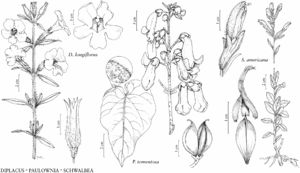Schwalbea americana
Sp. Pl. 2: 606. 1753.
Perennials blackening upon drying. Stems simple or branched from near base, 3–8 dm. Leaves: blade lanceolate to narrowly elliptic, 20–50 × 6–10 mm, gradually smaller distally, 3-nerved, surfaces densely pubescent. Pedicels ascending, 1–5 mm; bracteoles 2, linear, 6–12 mm, arising just proximal to calyx. Flowers: sepals 15–22 mm; calyx prominently 10–12-ribbed, oblique, glandular-pubescent, lobes unequal; petals suffused with purple in distal 1/2 and on veins, 22–35 mm; stamens included in adaxial lip; style included, 2–3 mm, glabrous. Capsules brown, ellipsoid to ovoid, 10–12 mm, glabrous. Seeds 2–2.5 mm, wings membranous. 2n = 36.
Phenology: Flowering Apr–Aug.
Habitat: Savannas, flatwoods, ecotones of depression ponds and streamheads, moist glacial outwash plains, pine-oak woodlands, longleaf pine, other pines northward and inland.
Elevation: 0–400 m.
Distribution
Ala., Conn., Del., Fla., Ga., Ky., La., Md., Mass., Miss., N.J., N.Y., N.C., S.C., Tenn., Va.
Discussion
Schwalbea americana is among the more fire-dependent species in the flora, responding favorably to annual burns. Documented host plants include Aletris farinosa, Carphephorus odoratissimus, Gaylussacia dumosa, Ilex glabra, and Pityopsis graminifolia. It has declined greatly since the advent of widespread fire suppression and is now federally listed as endangered; extant populations occur in Florida, Georgia, Louisiana, New Jersey, North Carolina, and South Carolina. Chaffseed was reported from eastern Texas by D. S. Correll and M. C. Johnston (1970); no voucher has been seen.
Schwalbea americana is in the Center for Plant Conservation’s National Collection of Endangered Plants.
Selected References
None.
Lower Taxa
"dm" is not declared as a valid unit of measurement for this property.
